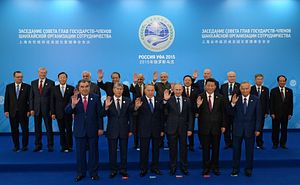On Tuesday, Nepal joined Turkey, Armenia, Azerbaijan, Cambodia, and Sri Lanka as one of the Shanghai Cooperation Organization’s (SCO) so-called “Dialogue Partners.” Nepali Foreign Minister Kamal Thapa signed a memorandum of understanding formalizing dialogue partner status for Kathmandu with the SCO’s secretary-general, Rashid Olimov, in Beijing. Nepal’s Prime Minister Khadga Prasad Sharma Oli, who is currently one a week-long state visit to China, attended the signing ceremony.
In a release announcing the agreement, Nepal’s foreign ministry notes that the signing ceremony was held at the SCO’s Secretariat in Beijing. Nepal had first sought dialogue partner status with the SCO back in 2007 and again in 2015, at the 15th SCO Summit, which was held in Ufa, Russia. The SCO contains several categories of membership, including full member states, acceding states, observer states, dialogue partners, and guest attendees. China, Kazakhstan, Kyrgyzstan, Russia, Tajikistan, and Uzbekistan are current members. India and Pakistan are slated to become members later this year, pending the successful conclusion of accession talks. Afghanistan, Mongolia, Belarus, and Iran are current observers.
Thapa, speaking at the ceremony in Beijing, noted that Nepal would “adhere to the principles, values and objectives” of the SCO. According to Xinhua, Nepal’s position as a dialogue partner within the SCO will allow it to participate in a range of SCO activities. Olimov suggested that Nepal’s accession would benefit other SCO member states and lead to mutually beneficial cooperation. Neither Thapa nor Olimov specified what SCO initiatives Nepal would be immediately involved in. Dialogue partner status affords limited say in the activities of the SCO and was established in 2008 to encourage states with an interest in the SCO’s mission to participate in the organization’s activities and summits without necessarily committing to full membership.
The SCO coordinates among its members of issues of economic and political significance in Eurasia, and has over the years developed competency in counter-terrorism and military collaboration as well. Though some commentary has suggested that the organization is something like an eastern counterbalance to the North Atlantic Treaty Organization (NATO), it is not a collective security organization. Founded in 1996, the organization was originally envisaged as a means to increase connectivity and dialogue between Russia, three former Soviet satellite states, namely Kazakhstan, Kyrgyzstan, and Tajikistan, and China. The SCO today has relations with other major supranational organizations, including the Association of Southeast Asian Nations (ASEAN), the Commonwealth of Independent States (CIS), the European Union (EU), and the Organization of Islamic Cooperation (OIC).

































